Disclaimer: Website Under Maintenance: Our website is currently under maintenance. We apologize for any inconveniences.
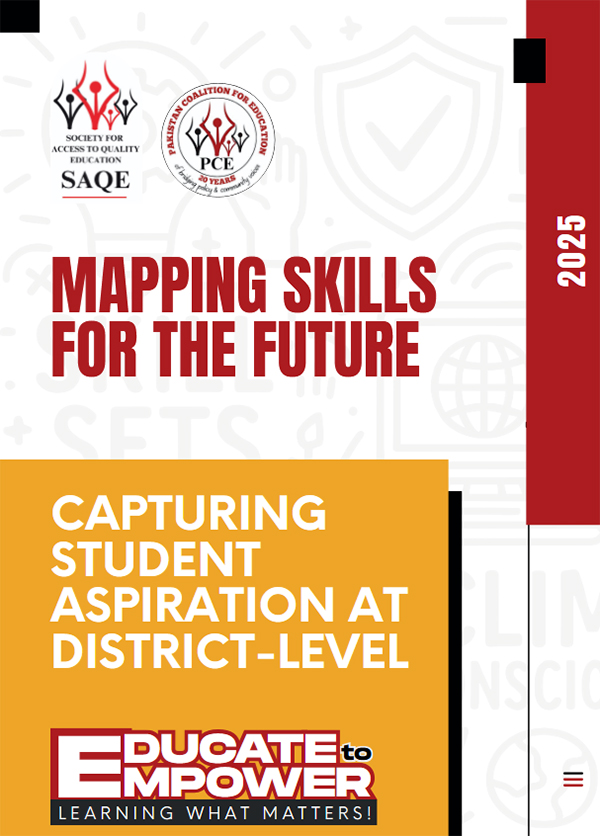
This study draws on data from a Skills Mapping Survey conducted by PCE members in 12 districts to better understand students’ skills and aspirations, with the aim of supporting more effective education planning. Using a structured survey approach, data were collected from Government Schools and Special Education Centers, covering girls (47%), boys (47%), and children with disabilities (6%) enrolled in grades 10 and 12 from each district.
The booklet analyzes student skill data and provides valuable insights for teachers, program planners, and stakeholders to design interventions that empower students to achieve their full potential. By mapping student skills and aspirations today, we lay the foundation for an inclusive, skilled, and confident future generation.
The data was cleaned, organized, and analyzed to generate disaggregated skill profiles for each district, with results presented across key demographic variables such as age, gender, grade level, and disability status. Skill-wise proficiency tables were developed to assess self-reported competency levels across five core skill domains.
The analysis highlights important patterns, disparities, and areas for targeted support, offering a data-driven foundation for informed decision-making and strategic educational interventions.
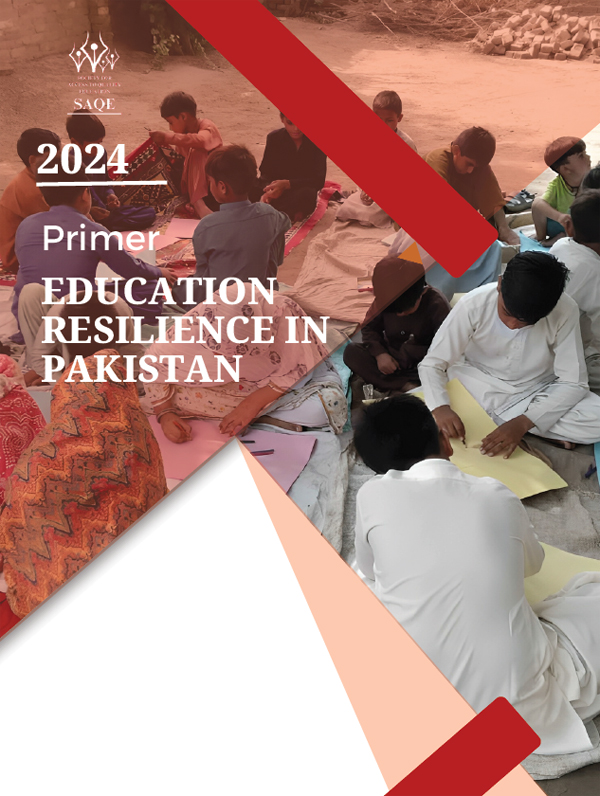
Education resilience is critical to ensuring that all children in Pakistan, regardless of socioeconomic background or gender, have continuous access to quality education, even in the face of significant challenges. Pakistan's education system faces frequent disruptions due to natural disasters, political instability, and socio-economic barriers. Building a resilient education system involves not only addressing these immediate challenges but also creating long-term strategies that enable schools, communities, and students to adapt, recover, and thrive despite adversities.
The 2022 floods in Pakistan underscored the vulnerability of the education sector, with extensive damage to school buildings, educational materials, and infrastructure, leading to prolonged interruptions in learning activities. These disruptions have long-term implications for the country's socio-economic development, making the need for a resilient education system more pressing than ever.
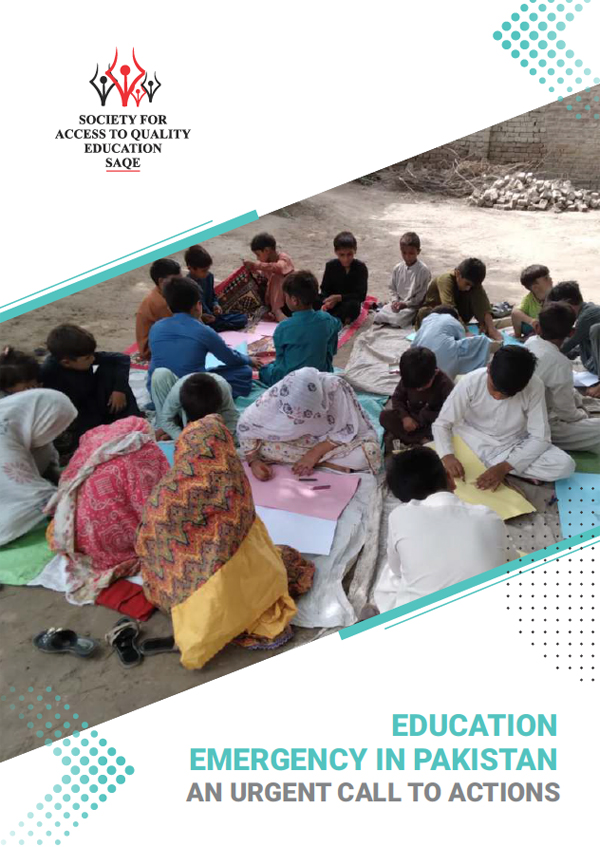
Pakistan is currently facing a severe education crisis, underscored by a staggering statistic: over 26 million children are out of school, the highest number in the world. This figure represents a blatant violation of the constitutional obligation under Article 25-A, which guarantees the right to free and quality education for all children. The crisis highlights deep-seated systemic issues within the education sector, further compounded by the country's persistent political and economic instability.
Regions like Sindh and Balochistan are especially susceptible to systemic educational failures, where enrolment rates are alarmingly low and educational outcomes are severely compromised. These provinces consistently lag behind in key educational indicators, reflecting the deep-rooted challenges that have been exacerbated by decades of neglect. As a result, Pakistan is significantly off track in meeting its international commitment to Sustainable Development Goal 4, which aims to ensure inclusive and equitable, quality education for all. The Education Emergency as declared by the Prime Minister of Pakistan requires targeted interventions in the underdeveloped areas of the country to address the widening gaps in educational access and quality.
This document addresses the education crisis in Pakistan by focusing on three interconnected themes: Gender Transformative Education, Equitable Education Financing, and Education Resilience. These themes are crucial for understanding the multifaceted nature of the challenges facing Pakistan's education system and for developing effective strategies to overcome them.
Gender Transformative Education is identified as a vital approach that seeks to integrate gender perspectives across all aspects of the education system. This approach challenges entrenched gender norms and inequalities, aiming to create a more inclusive learning environment where both boys and girls can thrive. However, despite some progress, gender biases remain deeply ingrained, particularly in rural areas. Initiatives such as the girls' stipend programmes have yielded positive results in increasing girls' enrolment, but these efforts are disconnected from other structural changes that are required for longterm change. To truly transform the education system, a comprehensive overhaul is required. This involves integrating gender sensitivity into teacher training, curricula, and resource allocation, and dismantling the socio-cultural barriers that continue to hinder girls' education.
Equitable Education Financing is another critical area that demands urgent attention. In Pakistan, the distribution of educational resources is heavily skewed, with significant disparities between affluent and impoverished regions. The country's education sector has long suffered from low public expenditure, inefficient resource allocation, and a heavy reliance on inconsistent donor funding. These issues have resulted in inadequate educational resources for the poorest children, further entrenching socio-economic inequalities. To address these challenges, it is not only important to increase public investment in education but to also ensure that it is equitably allocated to uplift the most marginalised in the country. Additionally, leveraging public-private partnerships could mobilise additional resources to provide quality education to the poorest of the poor in the country.
The resilience of Pakistan's education system is also a major concern, particularly in light of the frequent natural disasters that the country faces, such as the devastating floods of 2022. These disasters have repeatedly disrupted the education of millions of children, highlighting the urgent need for a more resilient infrastructure. The current lack of preparedness and resilient infrastructure exacerbates the challenges of providing continuous education, particularly in marginalised communities where the impact is most severe. Girls, in particular, are disproportionately affected by these disruptions, facing higher risks of dropping out due to socio-cultural barriers and safety concerns during emergencies. To enhance the resilience of the education system, it is crucial to invest in disaster-resistant infrastructure, develop robust remote learning strategies, and integrate psychosocial support mechanisms that address the mental health needs of students. These measures will help to create an education system that can withstand future shocks and ensure that all children, regardless of their circumstances, have access to continuous,quality education.
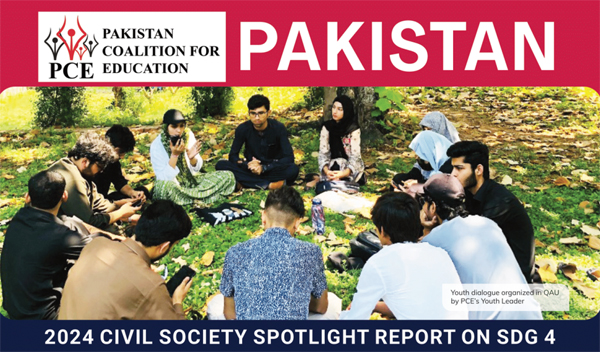
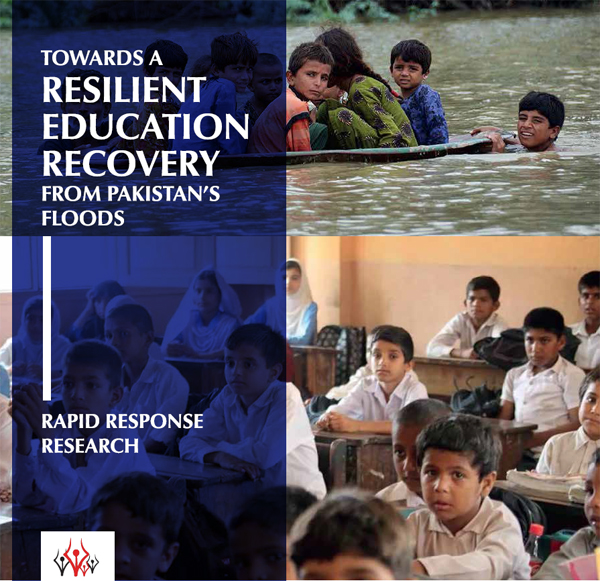
The 2022 floods in Pakistan have affected areas where learning levels and enrolment in primary and secondary schools were already very low. Before the current emergency, almost half of the children between the ages of 5-16 years in Sindh and Balochistan and almost one-fourth in Punjab were out of school (PSLM 2021).
Globally and in Pakistan, research has shown that even in the best of circumstances, emergencies such as flooding can disrupt children's education for multiple years without multidimensional interventions (INEE 2022; Andrabi et al. 2021). Girls in particular face the risk of having all their time absorbed in domestic labour (Thomas 2021) as well as facing a higher risk of early marriage (Bukhari and Rizvi, 2015).

This report provides an analysis of the education sector plans in the four major provinces of Pakistan: Balochistan, Khyber Pakhtunkhwa (KP), Punjab and Sindh. The scope of this analysis focuses on assessing the provisions for gender-responsive, resilient and inclusive education in Pakistan's education sector planning. Findings reveal that the provinces share common challenges in the realm of access, quality, and the governance of education.
All four provinces recognize the importance of incorporating gender considerations in education policies, including safe facilities, female teacher recruitment, and gender-sensitive curricula. However, there are significant gaps in implementation. The provinces lack gender-disaggregated education data to inform the planning and decision-making processes. Similarly, except KP, none of the provinces have gender-responsive education budgets making it impossible to assess how gender was factored into the planning, and implementation phases. Although stipends to encourage greater enrolment and retention of female students is a common strategy, the sector plans do not define effective monitoring mechanisms to ensure their efficient disbursement to and receipt by deserving households. This is especially important as data emerging from Sindh suggests that over 50% of the eligible recipients of education stipends have not claimed these funds. To address gender-related challenges, provinces should establish gender-specific performance indicators, integrate gender-responsive planning, prioritise female student safety, and set time-bound goals for infrastructure improvement.
This assessment reflects the four provinces' shared recognition of resilience in education. They all emphasise integrating climate education into the curriculum to empower students. Disaster-resilient infrastructure is also identified as a key intervention strategy. A comprehensive approach to resilience is, however, lacking. Mere curriculum integration isn't sufficient; f lexibility in learning methods for emergencies is needed. Digital infrastructure for teachers and students during crises is overlooked. Community-led planning, partnerships with relevant entities, psycho-social support, and early warning systems are also absent in the sector plans, indicating significant room for improvement. Finally, focus on climate resilience alone is not enough. Resilience needs to be viewed more holistically, taking into account the entire spectrum of emergencies that can potentially impact the functioning of the education system. Among others, these include epidemics, pandemics and conflict.
All the provinces also aspire to achieve disability-inclusive education systems. The provinces aim to create inclusive classrooms in mainstream schools and have special education centres for students with disabilities. Teacher training in inclusive methods and accessible infrastructure is also prioritized across all the provincial sector plans. However, there are several shared gaps in addressing physical and social barriers to making the education system truly inclusive. Most notably, inclusion is narrowly defined to only focus on disabilities, overlooking other critical dimensions like gender, religion, language, and ethnicity.
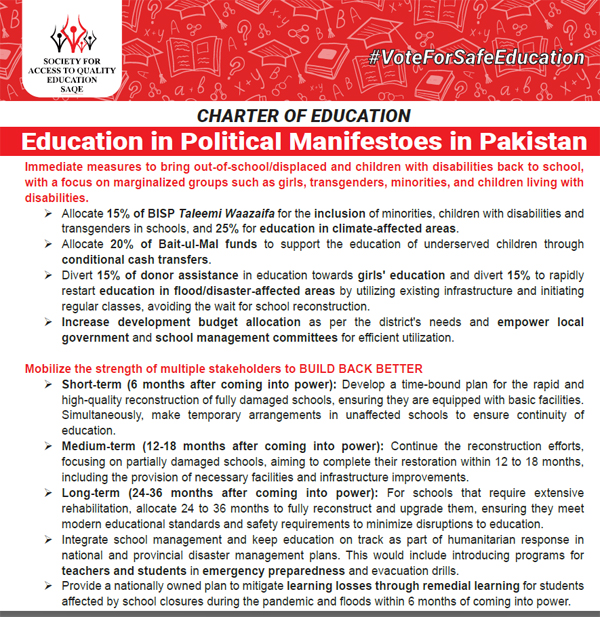
This charter, comprehensively highlighting the demands for reforms within the education sector, has been developed in consultation with stakeholders at the grassroots level. It has been fully endorsed by a consortium of organizations including education experts, CSO members, youth, and academicians. The official launch of this charter took place on November 9th during the 14th annual convention of PCE.
The Charter emphasizes the need to make educational institutes safe and calls for the enhancement of education delivery through teacher training programs. It also advocates for the replacement of single-classroom, multi-grade schools with a one-teacher-one-classroom approach. Additionally, the charter demands a revision of the curriculum to emphasize critical thinking, technical and vocational education and training (TVET), 21st-century skills, and to promote a culture of lifelong learning, non-violence, diversity and tolerance.
Under the “Vote For Safe Education” campaign we aim to mainstream the agenda of education in the upcoming general elections. PCE has conducted All-Parties roundtables in the Federal, Khyber Pakhtunkhwa and Punjab, where the charter was presented to the party members as a set of demands for the upcoming general elections.
The leaders are urged to declare an education emergency, and the political parties are encouraged to develop a joint Charter of Education at their end on the same lines as they had developed the Charter of Democracy. Such a charter should uphold the promise and enactment of Article 25-A and SDG-4 agenda for equitable education for all children.
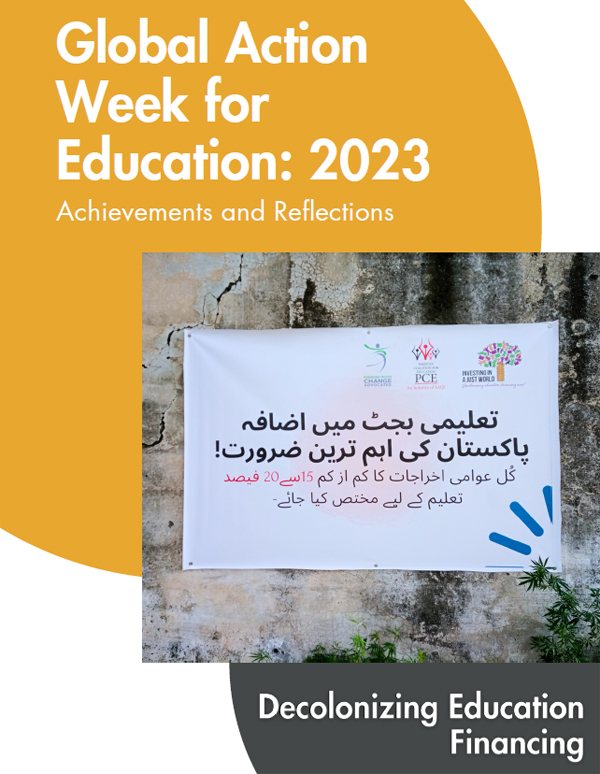
To commemorate the Global Action Week for Education, PCE conducted a series of activities in 12 Districts nationwide on the theme of "Decolonizing Education Financing" in the month of May 2023. This report seeks to present a thorough discourse of the activities, key highlights, scope, and effectiveness of the campaign in raising awareness and promoting action on educational financing and related challenges in Pakistan.
The campaign's primary goal was to comprehensively document and highlight the diverse challenges concerning education financing at the grassroots level, with a special emphasis on examining disability inclusiveness and gender responsiveness of budget allocation and expenditure mechanisms. Additionally, the campaign sought to instill a culture of social accountability within the local communities, empowering them to actively participate in decision-making processes and fostering a sense of responsibility and greater accountability among local authorities.
Through this campaign, around 200 key education sector stakeholders were engaged directly including local government representatives, Departments of Education, Planning and Development, Finance, Persons with Disabilities (PWDs), CSOs, PAGE members, Parents, Teachers and media. Millions of people were indirectly impacted by the strategically displayed banners in public places throughout the districts fostering awareness and curiosity on the cause. Banners were displayed outside government schools, district education offices, district courts, town squares, parks and markets, etc.
This campaign also serves as a crucial prerequisite for the Vote for Safe Education campaign PCE is spearheading, and the information gathered through the campaign has significantly contributed in capturing demands for education reforms at the grassroots level.
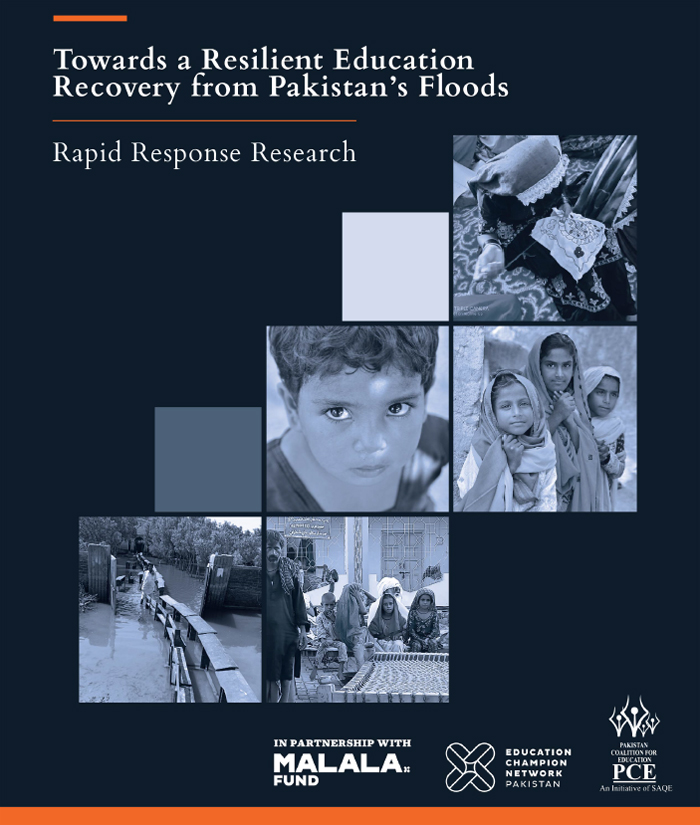
In Pakistan, education has been disrupted by multiple disasters that have interrupted the beginning and progress of a regular school year (the 2005 earthquake, 16 serious widespread floods including the disastrous floods of 2022, and the Covid-19 pandemic).
Even before the 2022 floods, almost half of the boys and girls between the ages of 5-16 years were already out of school in Sindh and Balochistan and almost one-fourth of those in Punjab were out of school (PSLM 2021), with the number of out-of-school girls higher than the number of out-of-school boys - 37 percent of girls aged 5-16 years compared to 27 percent of boys in the same age cohort (PSLM 2021). Sindh and Balochistan, the provinces most affected by the 2022 floods, ranked at the bottom with a very high proportion of out-of-school girls before the floods i.e., 59 percent of girls between 5-16 years of age were out-of-school in Balochistan, and 51 percent in Sindh (PSLM 2021). The 2022 floods in Pakistan have affected areas where learning levels and enrolment in primary and secondary schools were very low even before the floods. The recent disaster has further added to Pakistan’s education sector challenges by disrupting the learning of 3.5 million children. By January 2023 only 0.2 million affected children had been reached with education interventions (UN OCHA 2023).
Pakistan Coalition for Education (PCE) - an initiative of Society for Access to Quality Education, published a research titled “Towards a resilient education recovery from Pakistan’s floods”. The report has been authored by Dr. Moizza B Sarwar, a development expert and Research Associate at the Department of Social Policy and Intervention, University of Oxford and has been conducted in collaboration with Education Champions Network, with support from Malala Fund.
The report provides an analysis of Pakistan’s education response in the aftermath of emergencies in order to 1) highlight key gaps in our historical post-disaster education response and 2) provide key recommendations for governmental, civil society, and non-profit organizations for the successful development and roll-out of school disaster response plans.
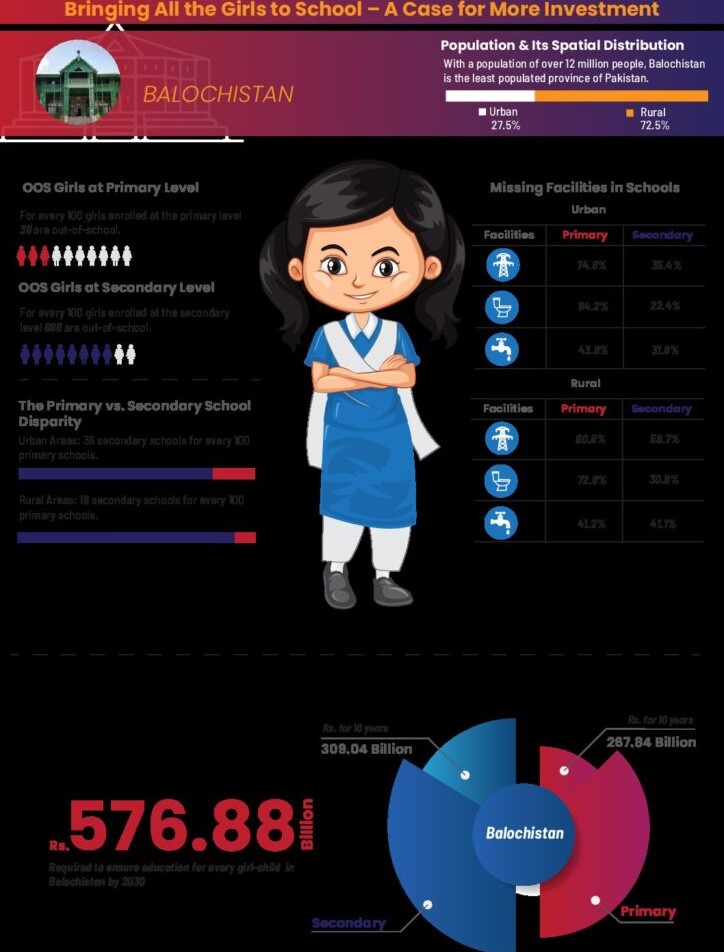
It goes without saying that education plays a fundamental role in the social and economic uplift of a society. Not only is it closely linked to poverty eradication, and accelerated economic growth but it also contributes towards reducing income inequality, greater social enrichment and inclusion and enhanced welfare.
Unfortunately, during its existence spanning over seven decades, Pakistan has consistently struggled to ensure that its children attend, stay and learn in schools. While the last decade or so has seen the country make some significant improvements in this field, especially in terms of enrollment, the fact that 22.8 million children – majority of whom are girls – continue to be deprived of education is a perturbing testament of the country’s overall gloomy education landscape.
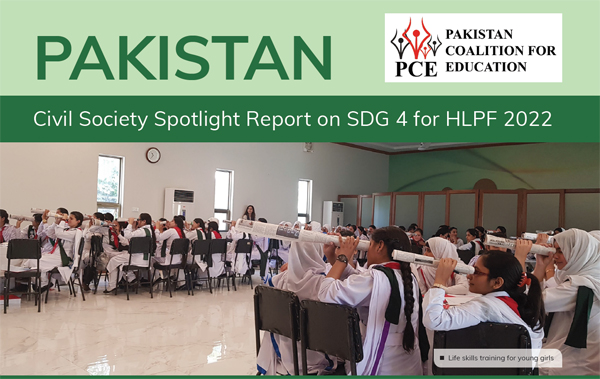
As of 23 June 2022, Pakistan has reported 1.53 million cases of COVID-19 with more than 30,000 deaths.1 Since mid-June 2022, as Pakistan grapples with BA.5, a new coronavirus variant, fears of a sixth wave of the novel coronavirus have heightened.2 Combined with the recent political debacle as well as the ongoing economic turmoil, including the International Monetary Fund (IMF) conditionalities dictating record-high petroleum prices in the country, Pakistan is beset with varied challenges and tasked with the dilemma of working towards the Sustainable Development Goal (SDG) commitments while undergoing a severe fiscal crisis.
Despite being prolific with regard to food production, 36.9% of the country's population remains food insecure,3 a majority of which are women and children. According to the National Nutrition Survey 2018-19, about 41.7% of women of reproductive age are anaemic, with a slightly higher proportion in rural (44.3%) than urban settings (40.2%). Similarly, adolescent girls in rural areas are more likely (58.1%) to be anaemic rather than those in urban areas (54.2%). Children fare no better; 37.6% of children under the age of 5 are affected by stunting while 7.1% experience wasting.
Currently, only 44% of the population has access to non-contaminated drinking water and only 46% have access to safely managed sanitation facilities on household premises.5 Dengue, malaria, cholera and other water-borne diseases continue to afflict the population of Pakistan.
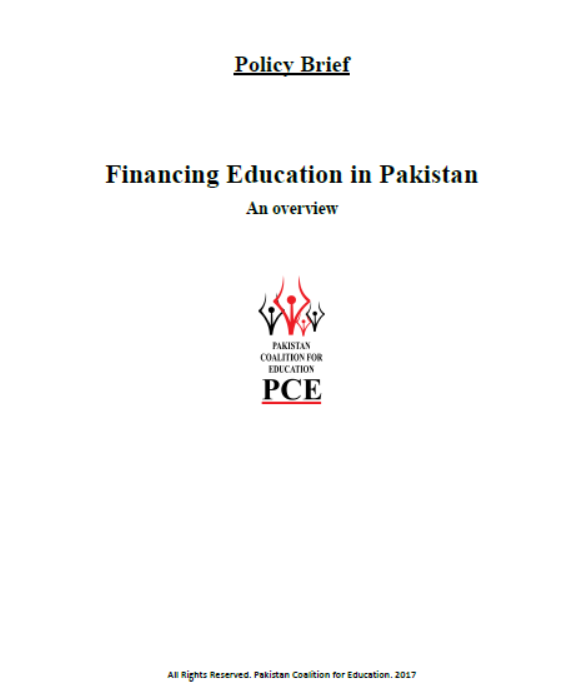
After the devolution of Education in 2010 through the 18th amendment, provinces have been given full authority on their education spending and allocations. Though, provinces have been given the autonomy, they are restricted by the amount of transfers from the federal. This policy brief analyses education budgetary allocations, its utilization and highlights the issues that directly affect education budget allocations. It also gives policy recommendations that can improve education allocations and spending over the course of next 5-10 years.
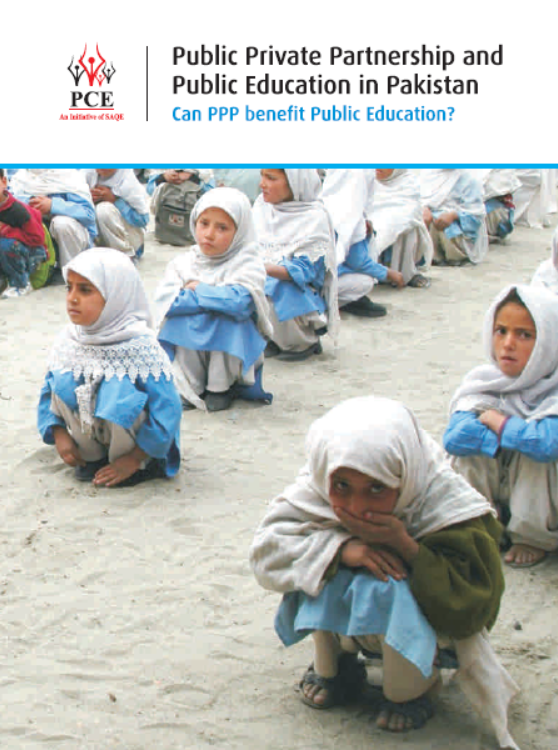
The term Public Private Partnership (PPP) is being applied to various arrangements of partnership between the public and the private sectors. The debate on PPP simultaneously raises positive and negative sentiments. The positive side believes that PPP pools in both public and private resources to benefit the citizens particularly the disadvantaged communities. The negative side believes that PPP is a disguised way of promoting privatization, which may seem positive in the beginning but ultimately leads to more inequitable distribution of opportunities.
The PPP arrangements are being applied in a number of social services including health, transport, infrastructure development, education etc. This report deals with PPPs in education only. It is important to investigate this further, as the current education policy of Pakistan identifies it as an important strategy to advance educational indicators and has pointed at several areas in education where PPP would be encouraged.
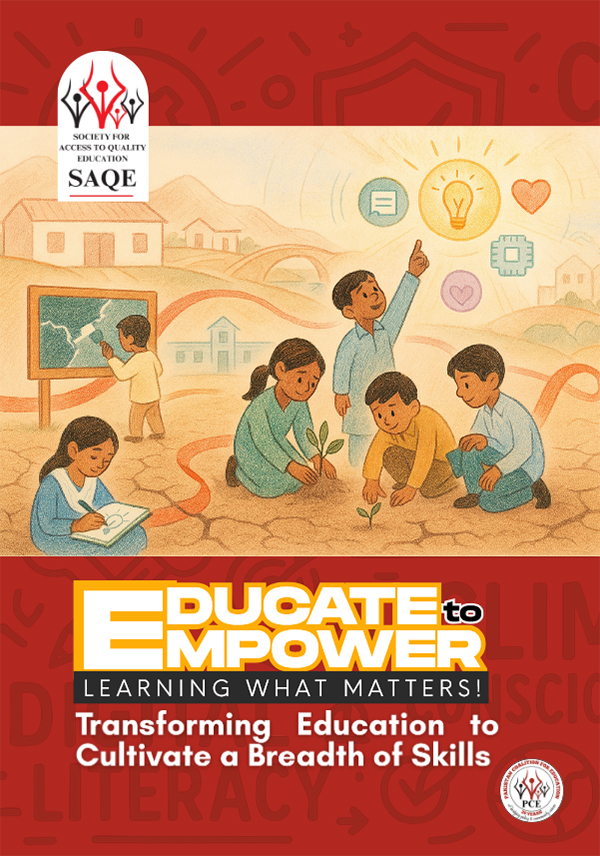
Pakistan's youth bulge, representing two-thirds of the population, highlights unprecedented potential for transformative economic growth and social development. A comprehensive analysis across the Federal capital and all four provinces reveals this opportunity is being systematically squandered by an education system in profound crisis that not only fails to provide access to millions of children but also fundamentally inadequately prepares enrolled students with essential 21st-century skills required for holistic development, active citizenship, and productive economic participation in a rapidly evolving world.
This research highlights the critical systemic contradictions that undermine education effectiveness and perpetuate cycles of failure. The barriers include a fundamental curriculum-assessment misalignment where high-stakes board examinations continue rewarding rote memorization and procedural recall despite national curricula promoting critical thinking, creativity, and problem-solving skills. Teachers remain inadequately trained in contemporary pedagogical methods, overburdened by large class sizes, and operate within systems offering minimal incentives for professional growth or innovation.
Infrastructural deficits compound these challenges, with chronic electricity shortages, non-functional science laboratories, and absent digital connectivity rendering discussions of digital literacy and inquiry-based learning purely academic for millions of students. Cultural resistance further perpetuates dysfunction, as marks-centric mindsets among parents, students, and administrators equate educational success solely with examination scores while perceiving vocational and technical education as inferior options. Fragmented governance structures ensure reforms remain ineffective, with disconnected curriculum bodies, examination boards, and teacher training institutions operating in silos divorced from real-world economic and societal needs.
The report proposes a comprehensive 12-point systemic transformation framework requiring holistic implementation rather than piecemeal reforms. These recommendations include fundamentally redefining education's purpose toward holistic, skills-based learning that cultivates critical thinking, problem-solving, digital literacy, collaboration, resilience, and a breadth of skills essential for success in the 21st century.
The recommendations demand revolutionizing both pedagogy through competency-based teacher training and assessment systems through radical examination board reforms that measure analytical skills and practical application rather than mere recall. They emphasize building modern educational pathways that directly connect to economic opportunities by elevating technical and vocational education into premier, aspirational tracks while forging collaborative partnerships between government, industry, and academia to ensure curriculum alignment with labor market demands.
The approach calls for empowering learners and communities through decentralized authority structures, comprehensive career counseling and mental health support systems, and validation of diverse learning pathways to ensure every child receives appropriate guidance and opportunities for success.
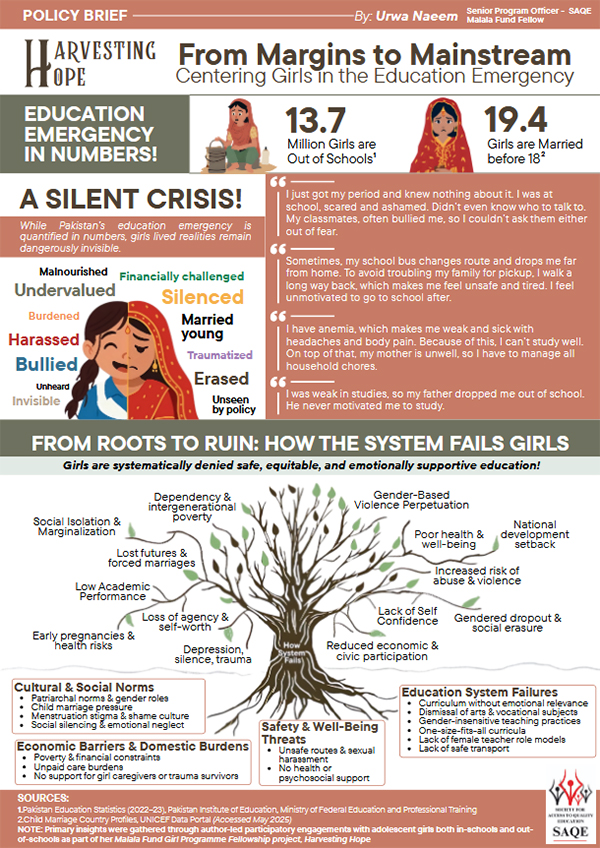
Through participatory engagement with adolescent girls, this policy brief identifies systemic failures, including patriarchal norms, economic barriers, inadequate education systems, and safety threats that generate cycles of marginalization leading to lost futures, forced marriages, and intergenerational poverty.
Girls face challenges such as unsafe school transport, early marriages, one-size-fits-all curricula, menstruation stigma, insufficient emotional support, and gender-insensitive teaching practices.
This policy brief offers comprehensive policy solutions to address this emergency. Recommendations include implementing education emergency protocols within gender justice frameworks, passing nationwide child marriage bans with a uniform age limit of 18, and integrating Social Emotional Learning (SEL) into curricula.
Strategic interventions involve gender-responsive financing with protected budgets, engaging male stakeholders as allies, deploying targeted incentives for marginalized girls, and providing trauma-informed teacher training. The framework emphasizes shifting from rote learning to skill-based education, leveraging religious and community leaders as advocates, and establishing girl-led initiatives that position girls as policy influencers driving systemic change.
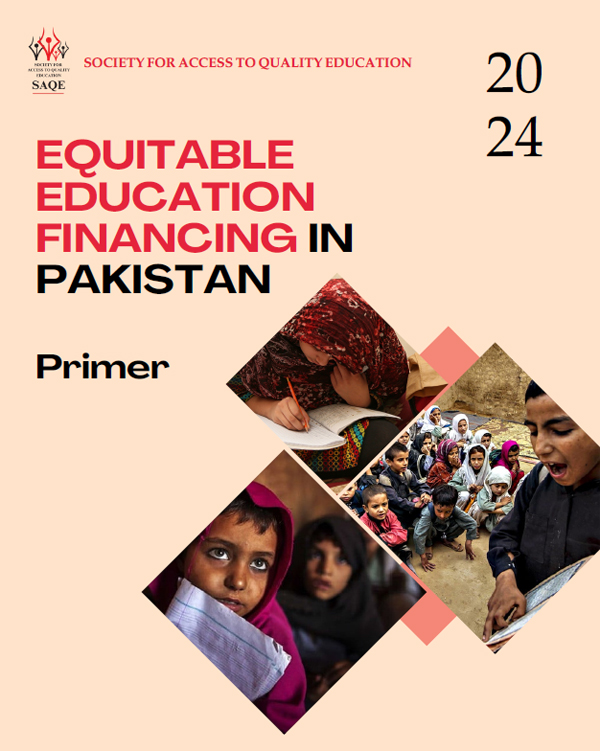
Equitable education financing is crucial for ensuring that all children in Pakistan, regardless of socio-economic status or gender, have access to quality education. The country faces significant disparities in educational opportunities, exacerbated by low public expenditure, and inefficient resource allocation. Public expenditure on education has historically been below 2% of GDP, far below the international benchmark of 4%, leading to inadequate educational resources, particularly for poor children. This primer outlines the current state of equitable education financing in Pakistan, highlights the challenges and initiatives, and presents future pathways to address these issues.
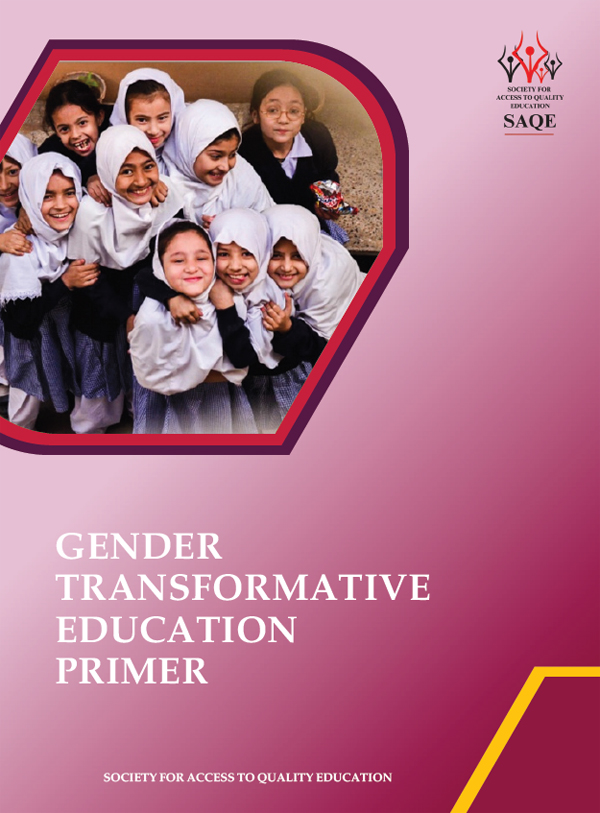
Gender Transformative Education (GTE) is a critical framework designed to address and dismantle the systemic gender inequalities that hinder educational progress, particularly for girls and marginalized groups in Pakistan. Despite significant strides in increasing gender parity in education, deep-rooted gender norms and socio-cultural barriers continue to impede the educational journey of many children. GTE seeks to create an education system where gender equality is not just an aspiration but a reality embedded in every aspect of the educational process from policy formulation to classroom interactions.
GTE goes beyond providing equal access to education; it challenges the societal norms and power dynamics that perpetuate gender inequality. The framework emphasizes the need for intentional changes across all levels of education, ensuring that every child, regardless of gender, has the opportunity to experience a meaningful educational journey and contribute equally to the nation's future. This primer highlights key initiatives, challenges, and future pathways to advancing Gender Transformative Education in Pakistan.
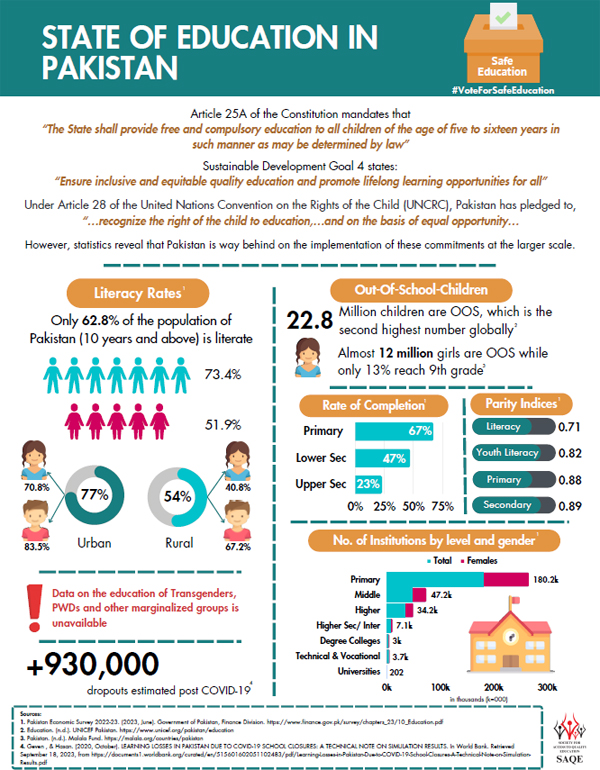
Pakistan Coalition for Education has developed this factsheet to provide a comprehensive snapshot of the “State of Education in Pakistan”. The data has been meticulously gathered from various sources, analyzed and presented to paint a vivid picture of the educational landscape.
It features key metrics including the number of Out-of-School-Children (OOSC), Literacy Rates, Enrolments, number of Institutions, Budgetary Allocations and Basic Services, etc. Under the “Vote For Safe Education” PCE aims to mobilize political parties to mainstream education reforms in their agendas for the upcoming election. This factsheet serves as an indispensable resource for policymakers, educators, and advocates alike, fostering informed decisions and strategic interventions aimed at advancing educational access and quality for all in the country.
![]()
This report provides a breakdown and analysis of the data gathered by PCE members during the Budget Tracking Activity. Data on education was collected from 12 Districts through various sources including one-on-one meetings with the District Education Offices (DEOs), education census reports and government data portals in the month of July. The data provided aims to assess the degree to which budget allocation and expenditure at the district level has succeeded in making public education provision gender-responsive, disability-inclusive, and disaster-responsive. The activity is also intended to promote social accountability among CSOs and citizens and empower them to actively engage with local MNAs/MPAs and education departments to participate in decision-making processes affecting their lives.
Our members faced challenges during the data collection process due to the unavailability of critical data like the enrolments of transgender, disabled and other minority students. In addition, District authorities in some districts were unwilling to provide information on the budget allocation and spendings, which hindered our ability to analyze the data and produce the necessary insights. Regardless, the insights gathered from this activity will be instrumental in developing policy recommendations and guiding future advocacy efforts.
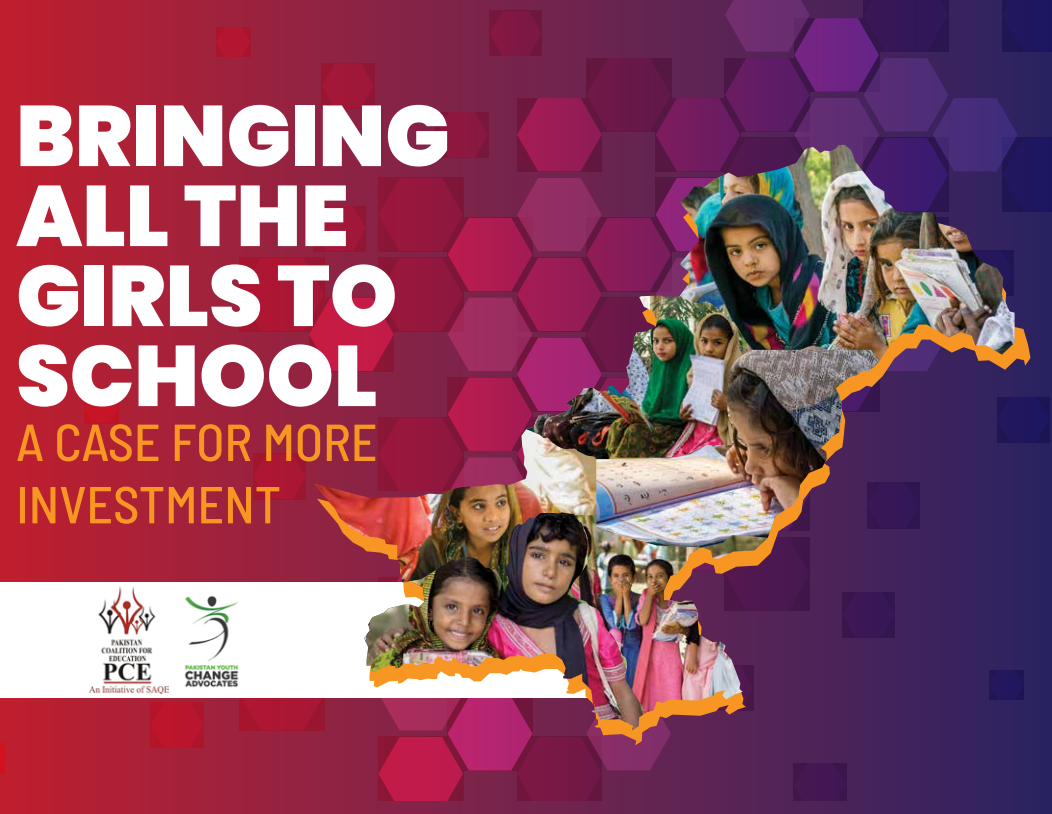
It goes without saying that education plays a fundamental role in the social and economic uplift of a society. Not only is it closely linked to poverty eradication, and accelerated economic growth but it also contributes towards reducing income inequality, greater social enrichment and inclusion and enhanced welfare. Unfortunately, during its existence spanning over seven decades, Pakistan has consistently struggled to ensure that its children attend, stay and learn in schools. While the last decade or so has seen the country make some significant improvements in this field, especially in terms of enrollment, the fact that 22.8 million children – majority of whom are girls – continue to be deprived of education is a perturbing testament of the country’s overall gloomy education landscape.
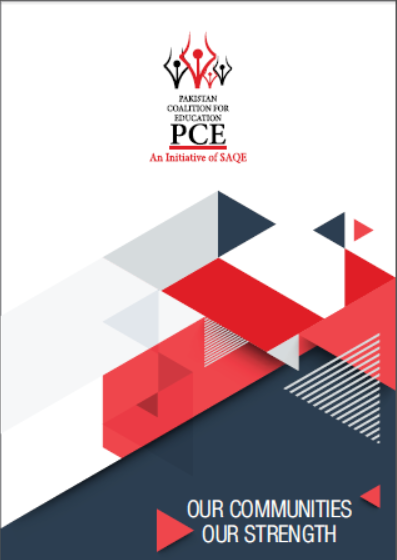
Pakistan Coalition for Education has been promoting people's constitutional right to Education since 2005. Over the period of more than a decade since its inception, PCE has grown immensely and is now taking up more issues such as girls' education, financing for education, public-private partnerships in education and Sustainable Development Goals. This document outlines PCE's Mission, Vision, scope of work, its mandate, its outreach and key thematic areas. .
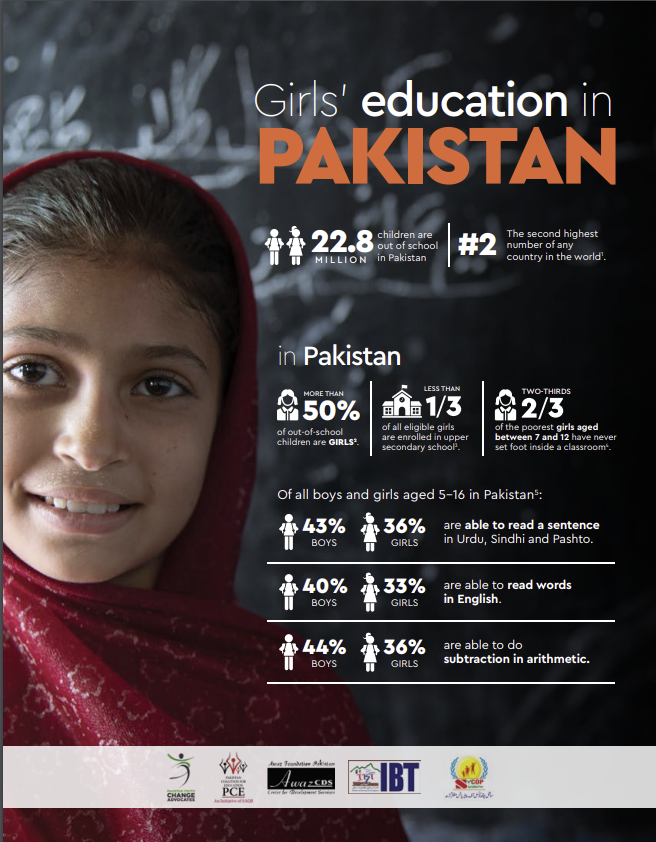
To mark the first 100 days of the new Pakistan government, we joined forces to call for the urgent convening of a national Girls' Education Task Force.
For this purpose, a series of fact sheets to draw attention to the state of girls’ education, the organisations — including Pakistan Coalition for Education (PCE), Pakistan Youth Change Advocates (PYCA), Social Youth Council of Patriots (Sycop), Idara Baraye Taleem-o-Taraqi (IBT), and Awaaz CDS — are calling on the new government to make girls’ education a specific priority as part of its newly announced, National Education Policy Framework.
The girls' education fact sheets bring together key data from various government departments and development organizations, presenting an overview of the situation at both a national and provincial level. They include key policy recommendations unique to each province.
The PPP arrangements are being applied in a number of social services including health, transport, infrastructure development, education etc. This report deals with PPPs in education only. It is important to investigate this further, as the current education policy of Pakistan identifies it as an important strategy to advance educational indicators and has pointed at several areas in education where PPP would be encouraged.
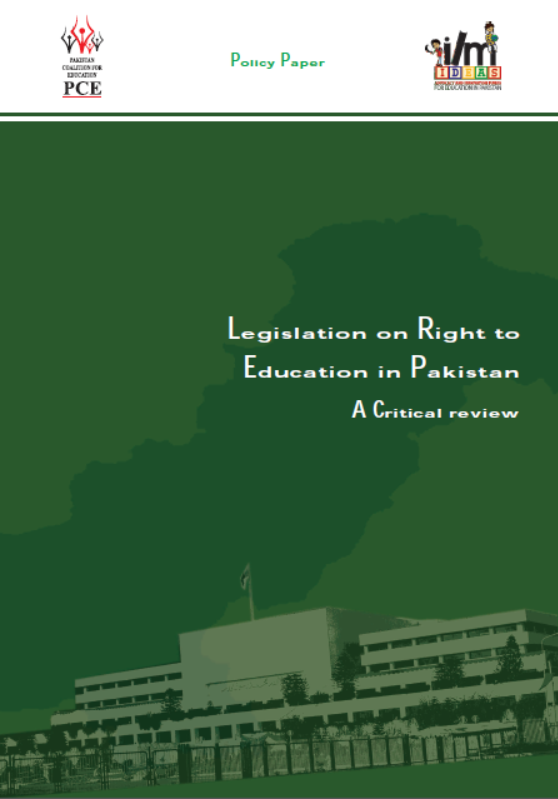
This policy paper invites a holistic appreciation of the concept of RTE in all its dimensions and facets. A comparison is drawn between the features and provisions of the various federal and provincial statutes that have been enacted in Sindh, Punjab and Balochistan. An analysis of the deficiencies and shortcomings of the existing legislation is offered in light of the overarching concept and requisites for RTE.
The PPP arrangements are being applied in a number of social services including health, transport, infrastructure development, education etc. This report deals with PPPs in education only. It is important to investigate this further, as the current education policy of Pakistan identifies it as an important strategy to advance educational indicators and has pointed at several areas in education where PPP would be encouraged.
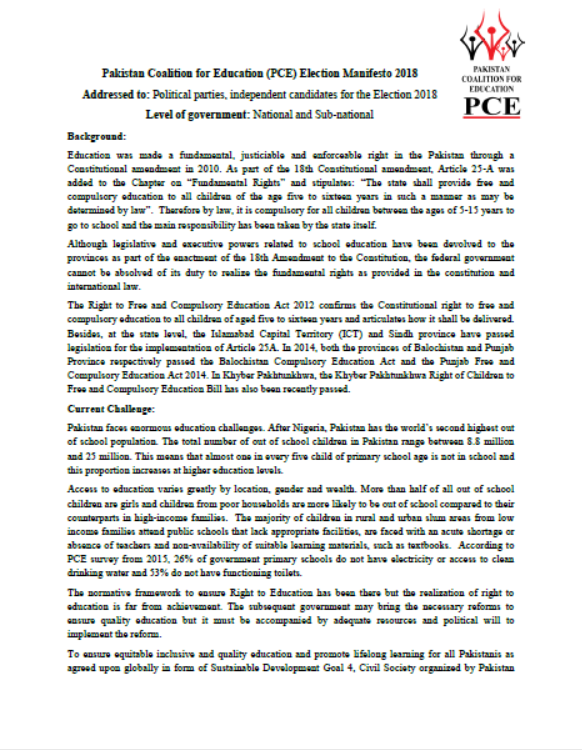
PCE organized various meetings and dialogues to stress on the need for all political parties to make time bound commitments with regards to education in their party manifestos for the general elections 2018. These platforms were used to reflect on manifestos of 2013 and the progress made in line with the education agendas defined by the political parties, five years down the road. Members of Standing Committee on Education from Punjab Assembly, representatives of political parties, academia, journalists and members of the civil society attended these events. PCE developed a minimum common agenda for education to be made a part of political party manifestos for 2018. This agenda, was endorsed by all political party representatives as well as civil society and media.
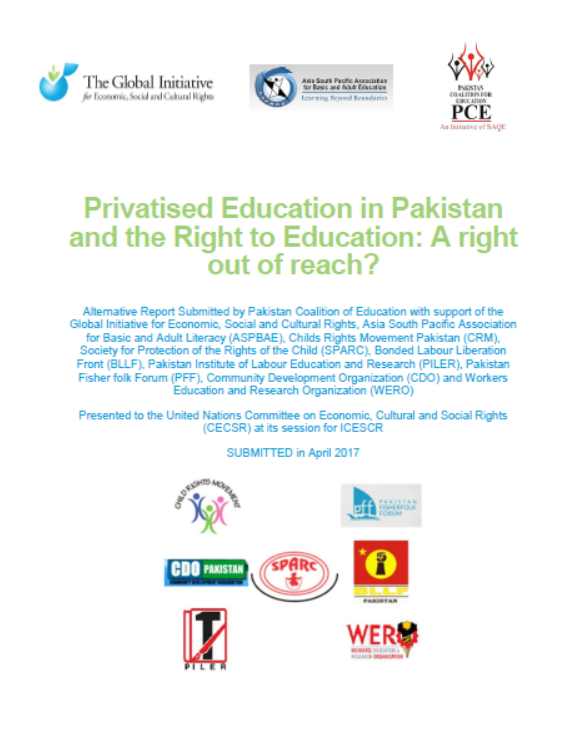
Alternative Report Submitted by Pakistan Coalition of Education to the United Nations Committee on Economic, Cultural and Social Rights (CECSR) at its session for ICESCR. This report looks at the implementation processes for Article 25-A, recognition of primary and secondary education as a fundamental right, lack of education spending and the rise of fee-charging private education which is resulting in discrimination against and stratification of some segments of society, especially children from the poorest Pakistani families. This report also analyses the lack of an adequate regulatory framework and monitoring mechanisms has created an anarchic space with low quality education.
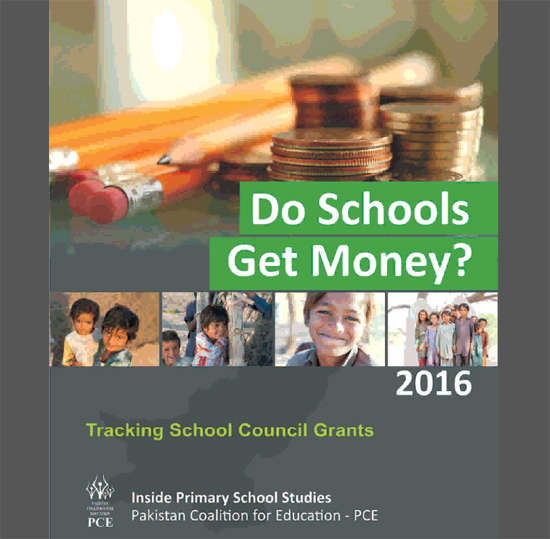
'Do Schools Get Money' 2016 could not have been possible without the collective efforts of many individuals, organizations, and concerned public and private sector officials. It has been a pleasure to have been working on such a project jointly as a coalition, which is aimed at finding the current situation of government primary schools in Pakistan. Pakistan Coalition for Education (PCE) would like to extend its gratitude and thank especially the Executive District Officers-Education (EDOs-E) of the 14 districts that we have conducted our research in. Without their facilitation and help, this report would not have been accomplished.
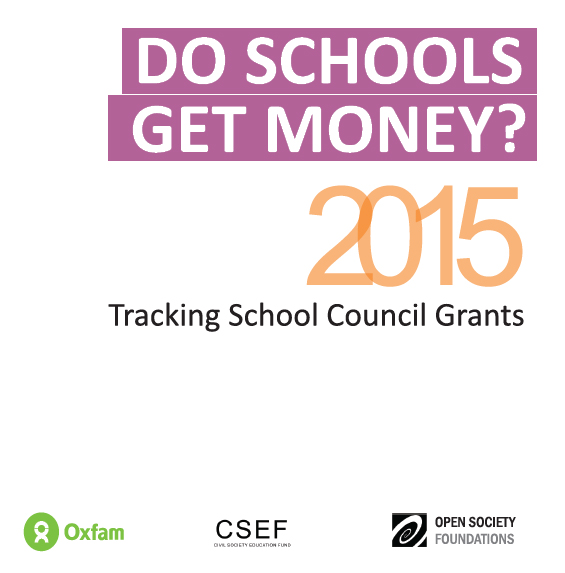
This research study could not have been possible without the collective efforts of many individuals, organizations and concerned public and private sector officials. It has been a pleasure and an honour to have worked on such an exciting endeavour where this joint effort aimed to gain insight into the workings of governance in government primary schools. Pakistan Coalition of Education (PCE) would like to especially thank the Executive District Officers-Education (EDO-E) of the 24 districts in which we have conducted our research. Without their facilitation and help this report would not have been compiled.
We are also grateful to our implementing organizations; Research and Community Development Organization (RCDO), Orchid, Rights & Rights Society, Emaan Welfare Organization, Al Kausar Welfare Organization, EHED, Ufaq, Sindh Development Society (SDS), Tanzim Haqooq ul Ibad, Sustainable Development Organization (SDO), Youth Organization and the National Rural Support Program (NRSP) for their relentless support and assisting us with the timely field enumerations. Our sincerest appreciation goes to the enumerators and the field surveyors who accessed the remote and far flung areas to gather the data and the government primary school teachers who provided us with valuable information on time.
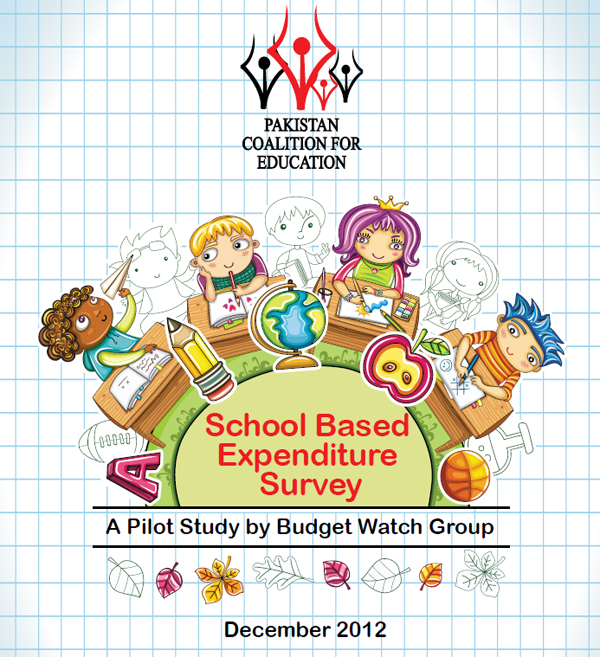
This survey aims at investigating the conditions and facilities, role of school management committee and grants in improvement of selected schools. Data was collected from 16 districts (including ICT and Rawalpindi) by 16 member organizations of Pakistan Coalition for Education. A questionnaire was devised to collect the information from the selected schools.
This was mainly a pilot study in order to determine the best possible strategies for survey on budgets provided to the schools and their expenditure out of this budget. The data for this study was collected from 2627 schools and 82% of them were primary schools. Moreover, findings of this study have been presented in different sections in order to facilitate the understanding of results and which were derived from the situational analysis rather than the correlational one.